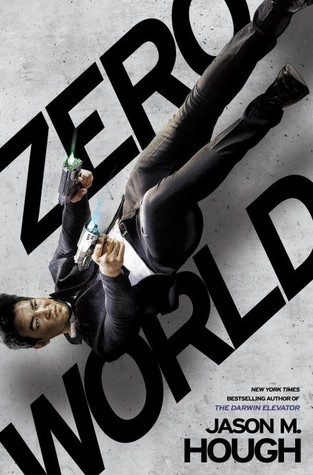Peter Caswell wakes in a silk-sheeted bed in a luxurious flat in London with only a song refrain running through his head to tell him who and where he is. You see, Peter is an assassin, the best in the world, thanks to his ability to blend in anywhere, but he never remembers where he goes or who he kills because of the implant in his head and the timed-release chemicals it contains. And that's just the way Peter wants it. The only thing he allows himself is knowing how many kills he's made and that only by the number of Sapporo beer bottles, out of twelve, with labels turned away, a count done in the moments before he reverts.
And so begins one of the most twisty-turning, heart-pounding, thought-provoking books I've read in quite some time. It would be easy to describe this book as a spy thriller wrapped up in science fiction. Easy, but probably not quite accurate, not to mention too simplistic for such a complex tale. Having never read any of Jason Hough's other works, I don't know if Zero World is characteristic for him or a story that shows him growing as an author, but I will say that what I read left me mightily impressed. It would be quite easy, with such a complex and fast-paced story, for authors to skimp on certain things such as character development or world building, but that's not the case here. In fact, I was completely blown away by how much thought Hough put into creating the parallel Earth on which most of the story takes place. The differences between our two worlds are often quite simple, yet at the same time truly innovative. (Such as opening a door: here we turn a doorknob; on the alternate Earth, a door opens by way of a foot latch. So simple, yet I dare say no-one would've thought of it had the question been posed. I know I wouldn't have. Or expressing appreciation: here we simply say “Thanks” whereas alt. Earth uses “Gratitude.” A subtle, yet powerful difference.*) Yet, those differences are never outlandish or thoughtless or untrue to the story; they feel completely organic to the culture Hough has created. Even the names of the characters populating the alternate Earth are a degree or two away from familiarity for us, yet a natural extension of alt. Earth's evolution. But what makes this world-building so amazing was how deftly Hough managed to insert so much backstory and so many details without any of it ever becoming overbearing or an info-dump. As a writer, I'm in awe. And I also kind of hate him. Just a little bit.
The storyline is told from the perspectives of both Peter Caswell and his alt-Earth counterpart, Melni, which is another way Hough gives us a greater view of the world(s) he's created. The thing is, as developed as Peter is, Hough didn't skimp on Melni's development to achieve that. Melni is just as fierce and dedicated to her mission as Peter is to hers and as the story progresses it peels away the layers of her character allowing us to find out what drives her, what scares her, what makes her Melni. Which is awesome. It's so refreshing to find a female co-protagonist who is neither a fainting wimp nor an aggro female who probably started out as male. Yes, Melni can be vulnerable and, yes, she can be hard-ass, but she never loses her humanity or her femininity. Even his secondary characters have a depth to them that gives the impression that, if Hough were asked to, could step up and become the center of the story without difficulty.
Then we get to the story itself, set sometime in the future, which is . . . complicated. I mean, you start out with an enhanced super-secret spy-assassin, then progress to space travel, wormhole travel, an alternate Earth, and one heck of a conspiracy that sets everything Peter ever knew or believed in on its ear, and you've got a story that can't be easily condensed into a short summary. At least not without giving a misleading impression of what you'll be reading or giving away any number of spoilers. For all its complexity and genre-bending subject matter, not to mention its hefty appearance, Zero World is a fast and engrossing read, sucking you in from page one and only reluctantly letting you go. It's one of those books that will keep you up at night, making you want to know what happens next and then what happens after that. Not to mention you get a bonus novella, The Dire Earth, at the end, allowing you to keep the adventure going when the main novels ends.
So, really, all I can say is if you like books of a sci-fi, spy-thriller, futuristic, alternate Earth, dystopic, action-adventure, military leaning (and who doesn't?), with just a dash of romance thrown in for good measure, I'd strongly suggest you pick up Zero World right this minute. And prepare to have your mind blown.
*About the only weakness comes from the main curse word Hough created. Where we say fucking, alt. Earth uses blixxing. Now, having gone through the arduous process of creating an adequately vivid and powerful curse word myself, I can appreciate what Hough went through to create blixxing and for that I can't fault him. But whereas fuck represents a clear, Anglo-Saxon directness, it's hard to imagine the linguistic path of blix (or is it blixx? I can't remember). I'm sure I'm in the minority with this kind of struggle and I fully acknowledge I am a linguistics geek, making this a petty quibble, but considering this was the only thing out of the entire book that gave me pause . . . that's pretty blixxing good!
Read from June 18 to July 2, 2015
Reviewed for the Amazon Vine Program August 12, 2015
